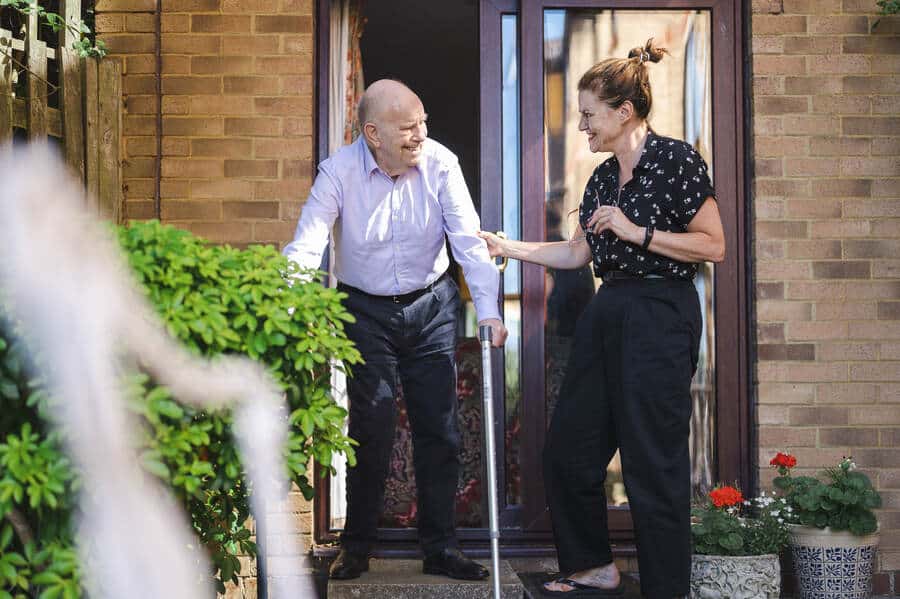Age UK calls for urgent shift towards joined up home and community care for older people

A major new report published this week from Age UK, ‘The State of Health and Care of Older People in England 2023’, has documented how the UK’s health and care system is struggling, and too often failing, to meet the needs of a growing older population.
The charity is calling for a switch away from the current over-reliance on acute hospital based care, towards a laser focus on prevention and early intervention to enable older people to stay fit and well in their own homes, and in care homes. This would, it states, be far better for older people and would also alleviate pressures on hospitals.
The new report shows how significant numbers of hospital admissions of older people could be avoided if they received help earlier on, before small health problems mushroom into crises requiring urgent clinical support. The key to resolving this, it states, is a strong political leadership from the Government and a drive right across the NHS and local authorities to make it happen.
However, it’s not all doom and gloom as Age UK says there are glimmers of hope in some places and the beginnings of the shift it wants to see, with the development of Community Falls Services, Hospital at Home services, Virtual Wards and Integrated Frailty Services. At present though these new approaches, it states, are only patchily available, whereas they need to be on offer to every older person, wherever they happen to live.
The charity also points out that there will be no lasting solutions in this area until politicians grip the problems in social care, support it’s under-paid and under-appreciated workforce, and expand social care services to tackle the enormous scale of unmet care need among older people.
The report revealed that in 2021/22 there were 4.8 million A&E attendances by older people. The rate of A&E attendances amongst over 80s went up by 40 per cent between 2012/13 and 2021/22. In 2019/20 alone there were 855,000 emergency admissions to hospital of older people which, the report states, could have been avoided with the right care at the right time.
Once admitted, older people have longer hospital stays and are more likely to experience delayed discharge. Over winter 2022/23, between 13,000 and 14,000 patients were stranded in hospital on any given day, up from around 4,500 in the same period in 2018/19.
In many areas, the report states, there are too few effective, joined up health and care services capable of identifying older people at risk of a health emergency and intervening to help them avoid it.
Statistics in the report revealed significant numbers of older people are finding it difficult to access the support they need from their GP, with too few nurses working in the community in either the NHS or social care.
In addition, rather than expanding to meet the needs of growing numbers of older people, state funded social care appears to have gone backwards in terms of the numbers being helped. This in turn is placing more burden and responsibility on unpaid carers – usually families – to fill the gap.
Between 2015 and 2020 there was a 24 per cent reduction in the number of nursing posts in social care and 12 per cent reduction in the number of district nursing posts.

The report found that since 2017/18, 36,000 fewer older people are getting long-term care from their local authority.
According to Age UK, an estimated 1.6 million people aged 65+ have unmet needs for care and support. Its research found that 45 per cent of older people were concerned about their ability to access their GP and 40 per cent of older people did not feel they had enough support to manage their health conditions.
With 10.5 million people aged over 65 in England, and rising, Age UK says that it’s imperative the Government changes tack now, to serve older people better and to make better use of the resources within health and social sare.
Given that only 26 per cent of people aged 65-74 do not live with at least one long term health condition, falling to just 14 per cent of those aged over 85 in England, the charity says that ensuring people have the support to stay well and manage their health at home is essential to the future sustainability of the NHS.
The report calls for a strong push, nationally and locally, to reverse the decline of primary and community health services and social care, so many more older people get more help, earlier, enabling them to stay well for longer at home and reducing their reliance on crisis health care in hospitals.
It calls for more community-based services to be developed and joined up in local areas so they include doctors, nurses, physiotherapists, social care staff, among others, and the voluntary sector too, working closely with GPs and their practice teams. These services, it states, also need to be able to flex to respond to older people’s and their unpaid carers’ needs, especially where the latter are themselves older people, as in the case of older couples.
Paul Farmer CBE, Chief Executive of Age UK said, “In many ways the picture painted by our new report is deeply depressing, but what strikes me the most is the wonderful opportunity we have now to switch to a much more effective approach to providing health and social care services for older people in their own homes and in care homes.
“After all, if we don’t do it on the back of findings like these, when will we? It’s clear that we need services to reach out to older people much sooner, particularly those living at home, quite often alone, whose health is fragile or declining.
“This would not only be great news for older people, and their families, providing much needed reassurance, it would be cost-effective too. And it would go a long way to relieving the enormous pressure on hospitals as well.
“Sometimes older people do need to go to hospital of course, but at the moment too many are doing so for want of the help they need at home. Then if they are admitted they are at risk of getting stuck in a hospital bed once medically fit to leave. That’s incredibly miserable for them and also jeopardises their recovery.
“We must do better by our older population and I’m sure we can. For example, some of the new Hospital at Home services and Virtual Wards are great – we just need a lot more of them, everywhere – with voluntary organisations like Age UK playing a full part alongside others.”
Caroline Abrahams CBE, Charity Director of Age UK, added: “At Age UK we are convinced the future lies in bringing health and social care services together locally, to provide better, earlier support for older people at home – but we won’t reap the rewards of this change of approach unless and until we also get a government prepared to grasp the nettle of rescuing and restoring social care – which is such a crucial component.”
She continued: “We urgently need an ambitious Social Care Workforce Plan, one that recognises the fantastic contributions of our care staff and rewards them fairly. The drive to recruit more care workers from abroad has been pretty successful, at least for some care providers, more so than many of us had expected, but meanwhile we know we are haemorrhaging more experienced care workers, including registered managers in care homes.
“Many of these people are worn out and fed up, and are quitting for better terms and conditions in hospitality, retail or indeed the NHS. They are the backbone of the social care workforce and they play a crucial role in setting and maintaining good standards of care. We must do more to give them hope for the future and a well thought through, funded Social Care Workforce Plan would really help.”


